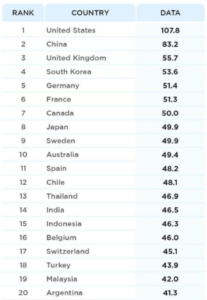
India, like much of the world, faces the paradox of immense economic potential alongside pressing social challenges that must be addressed to harness the benefits of artificial intelligence and achieve balanced growth. AI systems, with their complex technological dependencies, require an equivalent level of social and institutional collaboration among stakeholders, including governments, businesses, and startups. These stakeholders are influenced by factors such as regulatory frameworks, research, workforce availability, and financial investment. Despite this, critical resources for artificial intelligence development—such as high-quality data and substantial computational power—are still lacking and are in stages of evolution.
India stands at a crossroads in emerging technology, with an urgent need to overcome its hesitation and assert its position in the global AI landscape. Artificial intelligence is set to become a major geopolitical force, surpassing traditional indicators of power like military might and economic strength. The rise of companies like Nvidia, which have surged to immense valuations through artificial intelligence advancements, underscores the transformative potential of this technology. India’s lag in artificial intelligence could severely restrict its geopolitical and economic influence in the coming decades if not addressed swiftly.
READ I Climate finance: A perfect storm of challenges for India
Developing an AI ecosystem
The artificial intelligence ecosystem is a complex network of actors and institutions, relying on shared knowledge, resources, and technologies. The progression of this ecosystem depends heavily on the availability of critical resources like computing power and data management. However, artificial intelligence development’s dependence on high-quality data often benefits Big Tech companies in the Western world, which have privileged access to these vital resources. While India boasts a substantial consumer market and a talented IT workforce, it currently lacks the aggregated digital infrastructure and datasets necessary for developing proprietary artificial intelligence models and shows reluctance to invest significant capital in AI development.
Top Ranked AI Nations (TRAIN) Scorecard

The ongoing tech war between the United States and China highlights the far-reaching impact of technological dominance on global power dynamics. This rivalry is not merely about trade but about technological supremacy, with advancements in artificial intelligence, quantum computing, and 5G/6G technologies becoming key factors in geopolitical leverage. The pursuit of self-sufficiency and strategic decoupling by both nations is reshaping global supply chains and prompting countries to reassess their tech policies and alliances. As a result, technological prowess is increasingly defining national strength and influence.
Importance of semiconductor industry
As new technologies rely more on immense computing power, chips have become central to the modern world order. Dominance in semiconductor technology is now a strategic priority, signifying not only economic success but also the ability to project global influence. The critical importance of technological innovation and infrastructure in shaping the future global landscape underscores how control over key technologies will dictate the flow of economic and political power.
However, the current format of shaping public policy poses dangers of being hijacked by well-funded lobbies. Those with significant financial resources and clout often shape policy outcomes, overshadowing broader, more inclusive perspectives. This influence can lead to regulations that benefit a select few rather than the public good, resulting in policies that reflect the interests of the most powerful rather than those of the wider society.
The rise of artificial intelligence brings a stark reality: nations that lead in AI will shape the global order. AI’s influence extends beyond technology into national security, economic growth, and global diplomacy. The competitive edge provided by artificial intelligence is evident in the US-China tech rivalry, which has altered global supply chains, trade policies, and international alliances. For India, active engagement in the AI race is crucial to avoid marginalisation in the evolving global landscape.
While it may seem unrealistic for every country to become a global manufacturing hub, India—home to one-sixth of humanity—must develop intellectual property and patents to generate ongoing revenue. Without this, India risks remaining a lower-end service provider in the global tech hierarchy. To escape this cycle, India needs to advance up the value chain by fostering a culture of innovation and encouraging high-value tech development.
The current STEM education system in India requires substantial improvement to meet the demands of an AI-driven future. The focus must shift from rote learning to nurturing critical thinking, innovation, and practical skills. Teacher training is essential to ensure skilled educators who can inspire and mentor the next generation of artificial intelligence experts. Without such advancements, India will struggle to compete globally.
India’s research and development (R&D) investment remains inadequate, stifling innovation and the development of indigenous technologies. To boost AI capabilities, India must significantly increase R&D funding, incentivise private sector investment, and cultivate a culture of innovation. Only with these measures can India hope to develop the sophisticated artificial intelligence technologies crucial for future growth and national security.
The government’s emphasis on ‘Make in India’ manufacturing schemes, while beneficial for economic growth, is insufficient for artificial intelligence advancement. Artificial intelligence requires not only manufacturing capabilities but also advanced research infrastructure, robust data ecosystems, and a skilled workforce. To succeed, India must create an integrated ecosystem supporting AI development from research to commercialisation. Building world-class research facilities, providing substantial funding for AI projects, and fostering an environment conducive to innovation are critical.
The stakes are high: AI’s integration into sectors like banking, governance, healthcare, agriculture, education, and defense will determine nations’ competitive edge. Countries leading in artificial intelligence will command both economic power and geopolitical influence. For India, embracing artificial intelligence is not just an opportunity but an urgent necessity.
Srinath Sridharan is a strategic counsel with 25 years experience with leading corporates across diverse sectors including automobiles, e-commerce, advertising and financial services. He understands and ideates on intersection of finance, digital, contextual-finance, consumer, mobility, Urban transformation, and ESG. Actively engaged across growth policy conversations and public policy issues.

